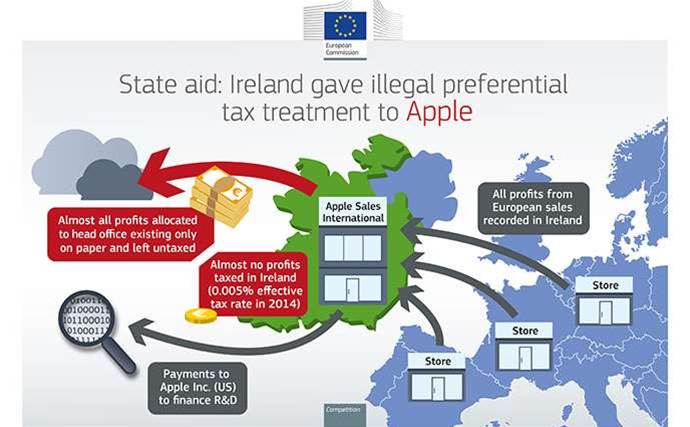Apple has been ordered to repay €13 billion (A$19.2 billion) in unpaid taxes after the European Commission found its Irish tax structure "illegal under EU state aid rules".
Ireland will be required to recover the unpaid taxes, which date back more than a decade.
The decision comes after an investigation spanning more than two years. The commission found that through two tax rulings, Ireland had "artificially lowered" the tax paid by Apple since 1991, enabling the Irish tax dodge that has enabled Apple to pay an effective tax rate of less than 1 percent.
The rulings endorsed a way to establish the taxable profits for two Irish incorporated companies of the Apple group (Apple Sales International and Apple Operations Europe), which did not correspond to economic reality: almost all sales profits recorded by the two companies were internally attributed to a "head office".
The commission's assessment showed that these "head offices" existed only on paper and could not have generated such profits. These profits allocated to the "head offices" were not subject to tax in any country under specific provisions of the Irish tax law, which are no longer in force.
As a result of the allocation method endorsed in the tax rulings, Apple only paid an effective corporate tax rate that declined from 1% in 2003 to 0.005% in 2014 on the profits of Apple Sales International.
International Apple subsidiaries, including Australia, report into Ireland. According to Apple Pty Limited's annual report lodged with corporate regulator ASIC, the Australian company's immediate holding company is Apple Operations International, incorporated in Ireland.
According to the European Commission's statement, "The amount of unpaid taxes to be recovered by the Irish authorities would be reduced if other countries were to require Apple to pay more taxes on the profits recorded by Apple Sales International and Apple Operations Europe for this period."
Apple has responded, saying it is confident the decision will be overturned.
Under scrutiny
Apple's tax structure has also been under scrutiny in Australia. The company fronted a 2015 Senate Enquiry into corporate tax avoidance, where it denied "inflating the transfer price" of products in order to reduce taxable income in Australia.
In 2015, Apple paid A$84.9 million in tax on income of A$207 million. The company's Australian revenue was A$7.9 billion for the 12 months to 25 September 2015.
Ireland can appeal the commission's decision. While the country will still be required to "recover the illegal state aid", it could, for example, place the recovered amount in an escrow account pending the outcome of the EU court proceedings.
The commission found that "Apple Operations Europe benefitted from a similar tax arrangement over the same period of time".

Commissioner Margrethe Vestager, who is in charge of competition policy at the European Commission, said: "Member states cannot give tax benefits to selected companies – this is illegal under EU state aid rules.
"The commission's investigation concluded that Ireland granted illegal tax benefits to Apple, which enabled it to pay substantially less tax than other businesses over many years. In fact, this selective treatment allowed Apple to pay an effective corporate tax rate of 1 percent on its European profits in 2003 down to 0.005 percent in 2014."
Irish tax rulings to Apple are illegal state aid. Effective taxation as low as 0,005 pct. #Apple has to repay up to €13 billion unpaid tax.
— Margrethe Vestager (@vestager) August 30, 2016
The fine could have been even larger, but for a statute of limitations on recovery, according to the statement. "The commission can only order recovery of illegal state aid for a 10-year period preceding the commission's first request for information in this matter, which dates back to 2013.
"Ireland must, therefore, recover from Apple the unpaid tax for the period since 2003, which amounts to up to €13 billion, plus interest.
"Around €50 million in unpaid taxes relate to the undue allocation of profits to the 'head office' of Apple Operations Europe. The remainder results from the undue allocation of profits to the 'head office' of Apple Sales International. The recovery period stops in 2014, as Apple changed its structure in Ireland as of 2015 and the ruling of 2007 no longer applies," according to the statement.
Online retailer Amazon and fast food chain McDonald's face similar probes over taxes in Luxembourg, while the Apple decision far outstrips a previous finding against coffee chain Starbucks, which has been ordered to pay up to €30 million (A$44 million) to the Dutch state.




_(21).jpg&h=142&w=230&c=1&s=1)

_(27).jpg&h=142&w=230&c=1&s=1)

.jpg&h=142&w=230&c=1&s=1)



.jpg&w=100&c=1&s=0)
_(8).jpg&w=100&c=1&s=0)











